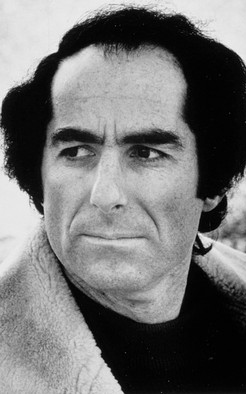Philip Roth Frases famosas
sobre o candidato republicano à Presidência dos EUA
Fonte: Revista IstoÉ Edição 1617
Portnoy's Complaint
Philip Roth frases e citações
The Human Stain
Portnoy's Complaint
The Ghost Writer
The Human Stain
Portnoy's Complaint
The Human Stain
The Human Stain
The Human Stain
The Human Stain
The Human Stain
The Human Stain
Nemesis
The Human Stain
The Human Stain
The Human Stain
The Human Stain
The Human Stain
The Human Stain
Portnoy's Complaint
The Human Stain
The Human Stain
The Human Stain
Portnoy's Complaint
The Human Stain
The Human Stain
Philip Roth: Frases em inglês
“Old age isn't a battle; old age is a massacre.”
Fonte: Everyman (2006)
“The road to hell is paved with works-in-progress.”
As quoted in "Works in Progress" in The New York Times Book Review (15 July 1979), page BR1
“Doctor doctor, what do you say, lets put the id back in yid”
Fonte: Portnoy's Complaint
“In my childhood I led the life of a sage, when I grew up I started climbing trees”
Fonte: The Ghost Writer
Portnoy's Complaint (1969)
Variante: It’s a family joke that when I was a tiny child I turned from the window out of which I was watching a snowstorm, and hopefully asked, "Momma, do we believe in winter?
Fonte: The Plot Against America (2004), Chapter 3, "June 1941 – December 1941: Following Christians", pp. 113–114 ISBN 0547345313.
Nathan Zuckerman to Philip Roth
The Facts: A Novelist's Autobiography (1988)
“Why must he mistrust his life just when he was more its master than he'd been in years?.”
Everyman (2006)
Interview for Martin Krasnik of the Guardian, (14 December 2005) http://www.theguardian.com/books/2005/dec/14/fiction.philiproth
“When you publish a book, it’s the world’s book. The world edits it.”
"A Visit with Philip Roth," interview with James Atlas, The New York Times Book Review (2 September 1979), p. BR1
Opening letter to Nathan Zuckerman
The Facts: A Novelist's Autobiography (1988)
“When the whole world doesn't believe in God, it will be a great place.”
Interview on CBS, 03 October 2010 https://www.youtube.com/watch?v=ZNv_a1CbX30, Philip Roth on Fame, Sex, and God http://www.cbsnews.com/news/philip-roth-on-fame-sex-and-god/ (3 October 2010)
